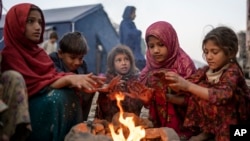A survey released Thursday revealed that over the past seven months, nearly 250,000 children have returned to Afghanistan from neighboring Pakistan with almost nothing, and they urgently need food, shelter and access to education.
The study by Save the Children said that more than 520,000 Afghans have returned home since September 2023 after Pakistan asked all undocumented foreigners to leave the country or face deportation. Nearly half of all the returnees are children.
Despite attending school in Pakistan, 65% of the children now back in Afghanistan are not enrolled in school. The majority, 85%, told the surveyors they did not have the necessary documents to register and enroll in school.
The survey did not say how many girls were among the children questioned as they also have to deal with the Taliban government’s ban on teenage girls’ education beyond the sixth grade.
'Crisis levels of hunger'
The study found that 99% of the families that returned and the communities hosting them in Afghanistan do not have sufficient food to last one to two months.
“About three-quarters of returnees and families in host communities reduced portion sizes or restricted the food consumption of adults so small children could eat on at least two days in the previous week,” said Save the Children in its study.
According to the findings of the survey, almost 40% of returnees and host families had to borrow food or depend on relatives and friends at least three days a week. Out of the number of respondents in total, 13% of returnees and 9% of host families had to rely on others for food every day.
It highlighted the dire conditions facing returnees in Afghanistan, where almost 8 million children “are facing crisis levels of hunger” due to years of conflict and multiple recent natural disasters such as earthquakes, floods, and ongoing drought.
'Already overstretched resources'
The United Nations estimates that close to 16 million Afghans in the country face severe food insecurity at crisis and emergency levels.
“Families are returning to Afghanistan with virtually nothing,” said Arshad Malik, country director for Save the Children. “The return of so many people is creating an additional strain on already overstretched resources,” he said.
Malik said that the crisis-hit country is struggling to cope with the pressure of displacement. In addition to the returns from Pakistan, he added nearly 600,000 Afghans arrived from neighboring Iran last year. “Afghanistan is also now home to the second largest number of internally displaced people in the world – or roughly 1 in 7 people.”
He noted that many undocumented Afghan children were born in Pakistan, and Afghanistan is not the place they call home.
No basic necessities
A 15-year-old girl living with her grandfather after returning with her mother and three siblings told the surveyors that the family sold everything before leaving Pakistan. Her name was not mentioned to protect her identity.
“We need shelter, living essentials, winter clothing, shoes, blankets, food and medicine. Afghanistan is very cold for us, and it is challenging because we do not have winter clothing,” said the girl.
The survey showed that nearly one in six families lives in tents and most returnees have little or no means of supporting themselves, with nearly half of them saying there were no jobs available in Afghanistan.
Economic and humanitarian conditions have deteriorated in the country since the fundamentalist Taliban returned to power nearly three years ago. They have imposed sweeping restrictions on women’s access to education, employment, and public life.
The curbs on women’s rights and other controversial policies have deterred the international community from formally recognizing the Taliban government and resuming much-needed development assistance to Afghanistan. Humanitarian aid is still being provided to the country through the U.N. and other foreign non-governmental organizations.







